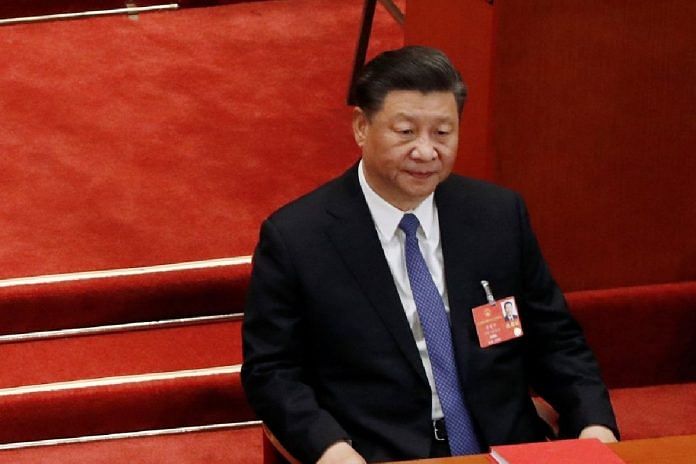New Delhi: In his first speech since securing an unprecedented third term as Chinese President, Xi Jinping said that the People’s Liberation Army (PLA) should be built into “a great wall of steel”, and Chinese people both at home and abroad should be united.
Speaking at the first session of 14th National People’s Congress Monday, the Chinese leader said: “We should comprehensively promote the modernisation of our national defense and our armed forces, and build the people’s military into a great wall of steel that can effectively safeguard our nation’s sovereignty…”
This comes as India and China continue to be engaged in a border conflict along the Line of Actual Control (LAC). In June 2020, troops clashed in the Galwan Valley in the first major conflict in Ladakh since the 1962 war.
Xi’s remarks also come as a resolution introduced in the US Senate recognised the McMahon Line as the official international boundary between China and Arunachal Pradesh, and reiterated support for India.
Three months prior, Indian and Chinese troops clashed in Arunachal’s Tawang sector.
Last week, 69-year-old Xi began his unprecedented third term as head of the Chinese Communist party (CCP) and the military, thereby extending his rule by another five years.
Also Read: Leh-based 14 Corps gets new commander ahead of LAC talks with China likely this month
‘Speed up modernisation’
During his speech, Xi Jinping stressed on the need to “speed up modernisation”, especially of the country’s armed forces, and to better coordinate development and national security in the country.
“We need to better coordinate development and security,” he said, adding: “Security is the foundation of development and stability is the prerequisite for prosperity. We must resolutely pursue a holistic approach to national security.”
Reiterating his vision for reunification of China, the Chinese leader also emphasised the need to promote the practice of ‘one country, two systems’ by citing Hong Kong as an example.
The ‘one country, two systems’ is a concept to promote Chinese unification over separated territories.
“We should fully, faithfully, and resolutely implement the policy of ‘one country, two systems’, under which the people of Hong Kong administer Hong Kong and the people of Macao administer Macao, both with a high degree of autonomy,” he said.
In May 2020, a year after Hong Kong was engulfed in pro-democracy protests, China had imposed a National Security Law, elected a new leader and consolidated the mainland’s power over the island territory.
Shortly after Xi’s speech at the 14th National People’s Congress, John Lee, chief executive of China’s Hong Kong Special Administrative Region (HKSAR), said Hong Kong will make full use of the advantages of ‘one country, two systems’, more actively integrate itself into China’s overall national development, and contribute to rejuvenating the Chinese nation.
‘Resolving Taiwan question’
Speaking to the nearly 3,000 delegates at the closing session of the National People’s Congress, Xi talked about the need to resolve the Taiwan question in the coming years. He strongly opposed foreign interference and separatist activities aimed at Taiwan independence.
“We should implement the Party’s overall policy for resolving the Taiwan question in the new era,” said Xi.
China must “resolutely oppose foreign interference and separatist activities aimed at Taiwan independence,” he added.
This comes months after former US House of Representatives Speaker Nancy Pelosi’s visit to Taiwan last August, which drew strong reactions from Beijing.
Earlier this month, China’s foreign minister Qin Gang had at a press briefing read from the Chinese constitution to underline that his country won’t hesitate to act on its anti-secession law.
Ratified by the Chinese government in 2005, the anti-secession law states that China may use “non-peaceful means” as a last resort to prevent Taiwan from establishing formal independence.
(Edited by Gitanjali Das)
Also Read: At G20 Foreign Ministers’ meet, China bats for its peace plan for Ukraine



